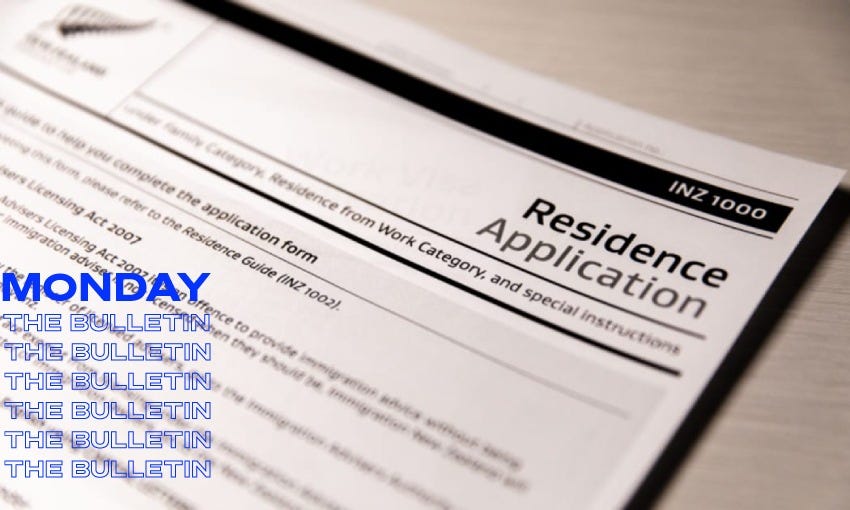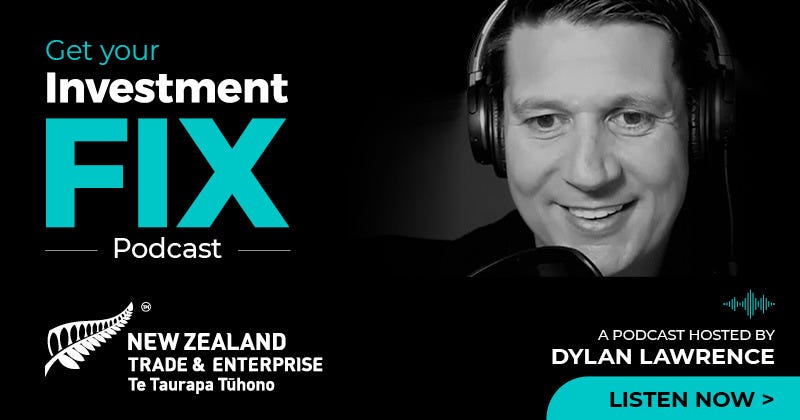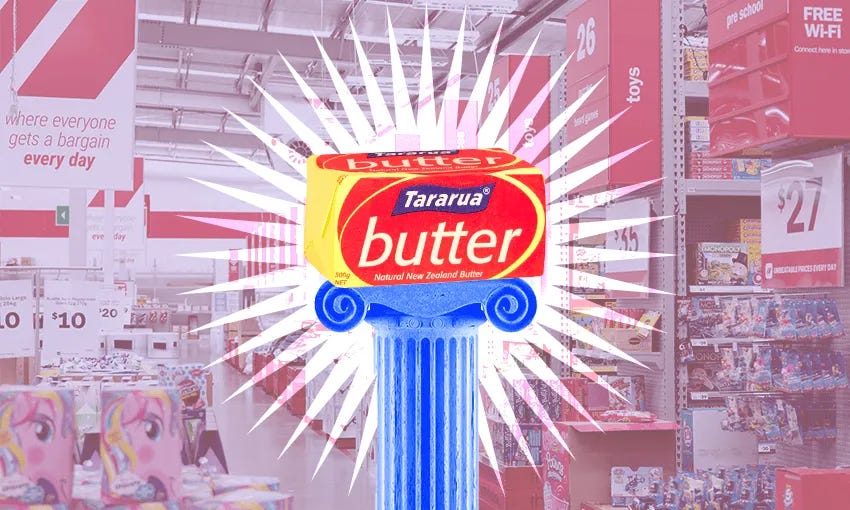Record number of new residents for NZ
New Zealand has created more residents in the last six months than any year in the last decade.
Mōrena and welcome to The Bulletin for Monday, May 30, by Anna Rawhiti-Connell. Presented in partnership with Z Energy.
In today’s edition: top diplomat on US trip gets Covid; more than a million not boosted; 150 Wellington buildings flawed; but first 200,000 new residents by end of year.
Almost 200,000 people have applied to become residents under the fast-track visa scheme (Photo: RNZ / Samuel Rillstone)
More new residents than any other year on record
RNZ’s Gill Bonnett has taken a look at immigration figures and found New Zealand has created more residents in the last six months than any year in the last decade. Bonnett reports that until last year “the government's 'planning range' for new residents amounted to an annual target of between 33,000 and 40,000.” Almost 200,000 people have applied to become residents under the fast-track visa scheme and one in four have been approved. Applications for the scheme close in July and the number of potential residents is already beyond the government's estimates by 30,000 people.
Application decisions uneven across nationalities
Bonnett’s analysis also found that of the applications that have been approved or declined, more than one in five of the 10,000 British applicants have had their residence decided, compared with fewer than one in 12 Chinese. Chinese applicants are also being declined at a higher rate than other nationalities: 3.9% of applications from Chinese people have been declined, compared to 2% for Indians and South Africans. New immigration settings announced earlier this month were criticised for creating a two-tier immigration system. Green party immigration spokesperson Ricardo Menéndez March said it amounted to a “white immigration policy”.
National’s Erica Stanford raises concerns about processing times
Bonnett estimates that based on the government’s “planning range target” it would usually take five or six years to approve 200,000 new residents. When the new immigration settings were first announced National spokesperson for immigration Erica Stanford queried the government's commitment to processing 80% of visa applications within a 12 month timeframe. Stanford challenged immigration minister Kris Faafoi in the house on it again on May 17 asking how he can rely on the new visa processing system when “just 51 of the 77,000 phase tworesident visa 2021 visa applications that use this new system have been processed in seven weeks, a rate of one a day?” Faafoi said he’d had assurances from Immigration NZ. The new Green list fast-track residency programme starts in September.
Productivity Commission to release report on immigration this week
Preliminary findings released last November said immigration policy was "disconnected" from infrastructure and housing supply. Immigration adviser Iain MacLeod noted a fortnight ago that “recent years have shown how fragile the country's infrastructure is to higher-than-normal population increases and migrant flows”. How much bearing the report will have, given the major “rebalancing” announcement was made a fortnight ago, is unclear but it may influence the skilled migrant policy which is currently under review.
‘A bit like an arranged marriage’: NZTE podcast explores the investor/investee relationship
Season 3 of NZTE’s Investment Fix podcast series has launched, and this time it brings together Kiwi start-ups and the investors who backed them. The result is a candid look at the importance of the investor/investee relationship. Over five episodes, Dylan Lawrence, NZTE’s GM of Investment, joins the founders or CEOs of Mint Innovation, Narrative Muse, Natural Pet Food Group and SafeStack, as well as their investors – from venture capital and private equity firms to angel and Māori investors. There’s also a special bonus episode featuring venture capital guru and Silicon Valley legend Randy Komisar. Listen on Apple or Spotify, or go to the NZTE website. (Sponsored)
Ministry of Foreign Affairs chief on US trip tests positive for Covid
Ministry of Foreign Affairs chief executive Chris Seed is on the US trip with the prime minister and tested positive yesterday. Governor of California Gavin Newsom hosted the New Zealand delegation in San Francisco over the weekend and announced that he’d tested positive for Covid yesterday morning. The prime minister flew to Washington DC this morning and is scheduled to visit the White House to meet US president Joe Biden and Vice President Kamala Harris in two days' time. Ardern has recently recovered from Covid so her chances of being infected again are very low. RNZ’s political editor, Jane Patterson writes “the timing couldn't be worse for Jacinda Ardern to be without her top diplomat at such a high stakes meeting.” Travel in the time of Covid.
More than a million eligible New Zealanders not boosted
The NZ Herald’s Jamie Morton has taken a look at why that is. 95% of New Zealanders have had two doses of the Covid vaccine yet only 72% of eligible people have had their booster shot. University of Auckland vaccinologist Helen Petousis-Harris makes an interesting point about semantics, saying having two courses should have been termed double dosed, rather than "fully vaccinated". She thinks people don’t know that boosting makes a difference with the omicron variant. While it might be that half the country has been infected with this variant of Covid, studies have demonstrated that boosting remains highly effective at keeping people out of hospital or from dying with the virus.
The Spinoff wouldn’t exist today without the generous support of our members.
If you want to support what we do, please consider joining up. There is no minimum to donate and you’ll not only help make local journalism happen but gain a bunch of great member-only perks, including a world version of The Bulletin, written by Peter Bale, delivered direct to your inbox every Thursday, less advertising, an RSS feed, cool merch and more. Join today!
150 buildings in Wellington have same flaw as soon-to-be vacated Ministry of Education office.
By the end of today, 1000 staff will have moved out of Mātauranga House in Wellington after a new engineering assessment found the building does not meet quake standards. It’s now been revealed 150 other buildings in Wellington have the same flaw. Back in 2020, NZ Herald’s Georgina Campbell wrote a comprehensive piece about the “yellow chapter” in relation to a $200m cost to strengthen the Wellington central library. The “yellow chapter” is a section of MBIE’s 2017 guidelines for seismic assessment that deals with concrete buildings. The guidelines were revised following the Kaikōura earthquake in 2016. Those guidelines are now being used by engineers to do seismic assessments which is why ratings have recently changed and why Ministry of Education staff have had to move out of their building.
Got some feedback about The Bulletin, or anything in the news? Get in touch with me at thebulletin@thespinoff.co.nz
Nick Blakiston wonders whether $4 blocks of butter portend a major grocery move for The Warehouse; Paul Davies discovers how international travel in the age of Covid is ratcheting up our anxieties; Chris Schulz shares the wild story of West Auckland’s Leisureland (aka Footrot Flats Fun Park); and Sally J Morgan tells the story of an outrageous death – her mum’s.
What the Silverlake deal could mean for rugby in New Zealand
The $200m deal between New Zealand Rugby and the US investment firm is expected to be signed on Thursday. The Herald’s Gregor Paul (paywalled) says fans will be the undisputed winners out of the deal. The partnership is “about trying to Americanise rugby in this country: to give the fan a more consumer-friendly in-stadia and at-home experience,” he writes. I sometimes watch NBA games with my brother and ask annoying questions like “How’s Scottie Pippen going?” He ignores me and instead gives me the lowdown on everything else. His deep love and knowledge of the sport is enabled by the NBA’s ambition to bring basketball to fans all over the world no matter where they are or what kind of device they have. Aspirational comparisons with the NBA might be a ways off for NZR but in 2019, basketball overtook rugby as the second most popular sport played in New Zealand high schools, so you might say it’s a decent template.
The awful inescapability of the Amber Heard/Johnny Depp trial
I wouldn’t generally point to this kind of thing here but I think even the most high-minded news readers will have stumbled across the rolling coverage of the Depp vs Heard defamation trial, if only to wonder what is going on. It’s been inescapable. Ryan Broderick has a great explanatory read on the way the trial has become ubiquitous online and how social media platforms incentivise the awful behaviour. I’ve been so thoroughly disgusted by the way the trial has played out across the internet that I’ve deleted all social media apps off my phone.












Why would we want to Americanise rugby? And the US investment company hides its owners behind a screen so that it's impossible to see who owns it. Not good. Nor is the fact that the money loaned has very high interest rates and the company has a nasty record as far forcing repayments in ways that Kiwis wouldn't want to see their All Blacks have to do.
While the trial got underway the Ukranian war was playing out in all its awfulness on our screens - Nothing could be more stark in contrast than seeing the Depp/Heard farce play out against the backdrop of the Ukranian tragedy - How small and frankly ludicrous these 2 actors and their enablers are - I loath them